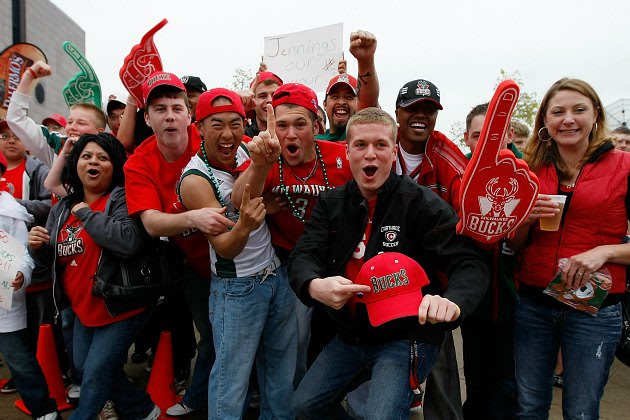 Bucks fans make a lot of noise before a 2010 playoff game (Scott Boehm/ Getty).
Bucks fans make a lot of noise before a 2010 playoff game (Scott Boehm/ Getty).
In the NBA, small market franchises have a fairly difficult time competing financially. While teams like the San Antonio Spurs and Oklahoma City Thunder have managed to become massive successes based on shrewd roster management and a measure of luck, the average franchise in a mid-market city can have a hard time establishing itself as a legitimate destination for players and fans. That's not to say they're financial disasters â€" owners tend to make their money when they sell the franchise â€" but they're not total cash cows.
This is all to say that many of these teams, including the Milwaukee Bucks, are not necessarily guaranteed to stay in their cities for the foreseeable future. As long as they don't have state-of-the-art arenas and the supposed profits that come with them, relocation remains a possibility.
So keep that context in mind as you read about the Bucks' hopes of signing a six-year extension on their lease for the Bradley Center, their home since 1988. From Don Walker for The Milwaukee Journal Sentinel (via EOB):
The BMO Harris Bradley Center board of directors and the Milwaukee Bucks have been discussing a new six-year lease that, if approved by the National Basketball Association, will provide stability for both sides as discussion continues over the possibility of a new, multi-purpose arena. [...]
If approved by the NBA, a six-year lease would be, by far, the longest lease the two sides have had in years. In general, the Bucks and the BMO Harris Bradley Center have gone year-to-year on leases.
Assuming the NBA signs off on the lease, the agreement is more good news for the financially strapped arena. In late May, representatives of the Metropolitan Milwaukee Association of Commerce, the Bradley Center, the Milwaukee Bucks and BMO Harris Bank announced a naming-rights deal. [...]
It is notable that the lease and financial commitments are both for six years. That seems to be the time frame BMO Harris Bradley Center officials, the MMAC and U.S. Sen. Herb Kohl (D-Wis.), the owner of the Bucks, have concluded is needed to start planning for a new arena.
The article attempts to paint this news as a good thing for the Bucks and the city, and in many ways it is. But it also seems as if the Bucks and owner Sen. Herb Kohl are setting themselves up for a coming debate with Milwaukee over their need for a new arena. As we've seen in Seattle and Sacramento in recent years, NBA owners are not shy about giving their home cities ultimatums. The terms of this deal, with a six-year lease when plain-old one-year agreements used to suffice, seems to be the Bucks' way of telling Milwaukee that they need a new building, or else.
In truth, that is not a ridiculous request: the Bradley Center is one of the oldest buildings in the league along with the Pistons' Palace of Auburn Hills and the Kings' Power Balance Pavilion (the Warriors' Oracle Arena and the Knicks' Madison Square Garden are technically older but recently renovated). Outdated arenas can keep teams from attracting free agents, and in today's league that's a problem. On the other hand, an arena shouldn't keep a front office from making smart decisions, and any claims about an inability to compete because of the Bradley Center are probably overblown.
What's clear, regardless of the merits of any pending move, is that it'd be a shame for Milwaukee to lose the Bucks. Since 1968, they've played host to players like Kareem Abdul-Jabbar and Oscar Robertson, memorable teams like Don Nelson's experimental group with Paul Pressey and Sidney Moncrief, and active stars like Ray Allen. There's a lot of history here, in much the same way that Seattle had with the Sonics. And while Milwaukee is not in crisis mode quite yet, it's easy to see things turning out that way in six years. Hopefully everyone will start preparing now to avoid that scenario.
No comments:
Post a Comment